Why Doctors STILL Aren't Talking About Introducing Allergenic Foods with Ruchi Gupta, MD, MPH
In this episode we're talking about:
- Why only 13% of parents are hearing the message to introduce peanut to their babies
- How overpathologizing the starting of solid foods is stressing parents & caregivers out
- What she would change about medical school curriculum to increase food allergy prevention
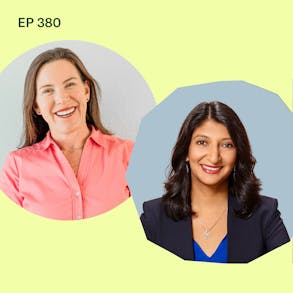
LISTEN TO THIS EPISODE
Episode Description
When you were at your 4 or 6 month well check with your baby, did your pediatrician mention the importance of introducing peanut early and often? In this episode pediatrician and researcher Dr. Ruchi Gupta is talking about why only 13% of parents and caregivers are aware of the recommendations to introduce peanuts to babies early and often.
From her unique vantage point as one of the most prolific researchers and foremost experts in pediatric food allergy - plus the mom of a child with food allergy, Dr. Gupta will help us understand the research that supports early allergenic food introduction guidelines, why the messages aren’t getting shared by pediatricians to parents and a little history lesson into just how dramatically allergenic food introduction in infants has changed over the last 20 years.
About the Guest

- Dr. Ruchi Gupta is a pediatrician and food allergy researcher
- Dr. Gupta is the founding director of Northwestern University’s Center for Food Allergy and Asthma Research & publishes extensively about pediatric food allergy
Links from this Episode
- Prevalence and Severity of Food Allergies Among Adults https://pubmed.ncbi.nlm.nih.gov/30646188/
- Washington Post article https://www.washingtonpost.com/wellness/2023/08/01/peanut-allergy-early-exposure/
- Annals of Allergy, Asthma & Immunology Addendum guidelines for the prevention of peanut allergy in the United States https://www.annallergy.org/article/S1081-1206(16)31164-4/fulltext
- Baby-Led Weaning with Katie Ferraro program with the 100 First Foods™ Daily Meal Plan, join here: https://babyledweaning.co/program
- Baby-Led Weaning for Beginners free online workshop with 100 First Foods™ list to all attendees, register here: https://babyledweaning.co/baby-led-weaning-for-beginners
Other episodes related to this topic:
- Episode 180 - Food Allergy FAQ with Ruchi Gupta, MD, MPH

Latest Episodes
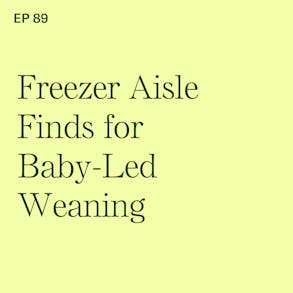
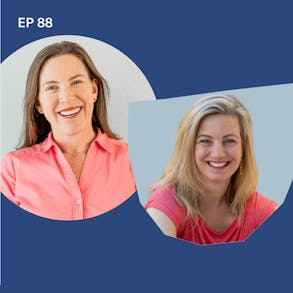
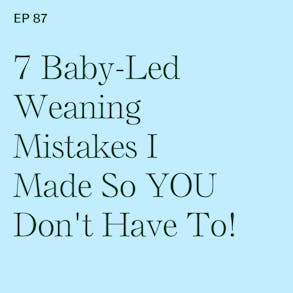
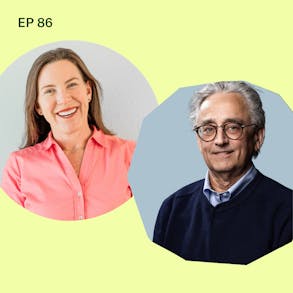

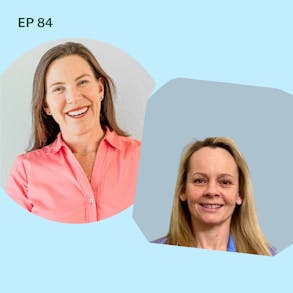
Katie Ferraro (4m 10s):
Hey there, I'm Katie Ferraro, Registered Dietitian, college nutrition professor, and mom of seven specializing in baby-led weaning. Here on the Baby-Led Weaning Made Easy podcast, I help you strip out all of the noise and nonsense about feeding, leading you with the confidence and knowledge you need to give your baby a safe start to solid foods using baby-led weaning. When you took your baby to their four or six month well check, did the pediatrician mention the importance of introducing peanut early and often? Now, maybe you've heard this message, but like take yourself back to that doctor's appointment. Did your doctor talk about it to you or mention it?
Katie Ferraro (4m 51s):
My guest today is Dr. Ruchi Gupta. She's a pediatrician and researcher at Northwestern University where she's the founding director of the Center for Food Allergy and Asthma Research. So Dr. Gupta's team is internationally recognized for their research in Food Allergy. She sits on numerous committees that established the international guidelines. She's published over 140 research papers on food allergy. And the study that we're going to talk about today in this interview was one that recently found that only 13% of parents and caregivers who she surveyed in a very large sample size were aware of the recommendations to introduce peanut early and often to babies. Okay, so our discussion is gonna surround, well what's the research that supports these early introduction guidelines and why aren't these messages getting shared by pediatricians to parents?
Katie Ferraro (5m 32s):
And then she also gives us a little history lesson into just how dramatically allergenic food introduction in infants has changed over the last 20 years. There are few researchers as prolific as Dr. Gupta. I literally don't know where she gets the time to do all this and then still be kind enough to like do every interview request. She's always in every major, like every time we're talking about food allergy in kids, you see Dr. Gupta's name. She is a parent also of a child with a food allergy, so she personally understands the challenges of food allergy and she has this just amazing knack for translating her team's research into practical, actionable steps that parents, caregivers, and healthcare providers can take in order to help reduce the burden of food allergy in the pediatric population.
Katie Ferraro (6m 13s):
So with no further ado, here's Dr. Rucci Gupta and she's talking about why doctors still aren't talking about introducing allergenic foods early and often.
Ruchi Gupta (6m 26s):
Oh my gosh, it's my pleasure Katie. Thanks for having me.
Katie Ferraro (6m 29s):
Okay, you were previously here, we did a food allergy Q&A section. We had like huge downloads on it. People just like wanna hear you talk about food allergies for their babies. And that was around the time your book Food Without Fear came out. So what's been happening since then? Do you have any work projects or research, anything you're currently excited about?
Ruchi Gupta (6m 46s):
Oh, so much. All right. Where do I begin? Well since we're talking about early introduction and prevention, you know some of our biggest projects are this early introduction, trying to get pediatricians to advocate for early introduction with their patients and then trying to get families to go home and do it, you know, and really turn the tide of this epidemic like we want to shut it down, right? So...
Katie Ferraro (7m 12s):
I like that.
Ruchi Gupta (7m 13s):
Now that we know that early introduction at least of peanuts and eggs works, we need to get every parent doing it with their child. The other big study we have, this is a really exciting study and hardest study I've ever done in my career thus far. But we, you know, a lot of people ask, okay, you said peanuts and eggs, I did that. I've had patients come back and say, but now my kid's allergenic to cashews, you know, so how come they didn't tell me to introduce that early? And so people keep asking, what about all these other allergens? So, we are doing a study here in Chicago where we're doing an eight food introduction. So we're Introducing, milk, egg, peanuts, cashews, walnuts, sesame, soy, almond, all to infants like in that first year of life.
Katie Ferraro (7m 58s):
Why not wheat? Like why? Why just eight?
Ruchi Gupta (7m 60s):
I know, I know Oh, my gosh.
Katie Ferraro (8m 2s):
Why didn't you just do nine?
Ruchi Gupta (8m 4s):
Because so many babies are getting wheat, because wheat is a a common food. So, we were trying to hit some of the ones that they may...
Katie Ferraro (8m 12s):
Oh. my gosh, I totally disagree. They're still feeding rice foods. You have no idea. Yes. And parents are really scared of wheat, and we talk about not introducing bread because of the high sodium content and potential choking hazard. And parents, I find that parents are really confused about wheat. I mean I know it's probably late to change the study protocol, but in our experience parents struggle with wheat as well and I think they would be interested to know if that's one of the ones they should.
Ruchi Gupta (8m 36s):
Wow. They should.
Katie Ferraro (8m 37s):
They should. Yeah, they should, 'cause there's no benefit to withholding 'em. That's what we also say. Like listen, we know we need more research. We know we've got peanut down, but don't stop there because there's absolutely no benefit. No benefit whatsoever to withholding it. But what I wanna talk about today is that like sometimes these messages aren't getting out there. I know you are like the most data-driven person I know. According to one survey that you conducted results that came out in 2019, up to 10.8% of Americans show convincing evidence of a food allergy. So 19% self-identify as having a food allergy, but only 5% have a physician confirmed diagnosis for food allergy. So like what's driving this huge gap between perception versus confirmation of food allergy in adults and then is it similar for kids and babies?
Ruchi Gupta (9m 18s):
Okay, you said a lot of really important things there. So I'm gonna back it up just a little bit. One thing you said that was so key is yes, introduce, introduce, introduce. So for that, what I'll tell you as a pediatrician is that I really believe we medicalize feeding way too much, right? Everything is medicalized one food at a time, wait three to five days. Totally disagree with any of that because what's happening is we're not getting that diversity in the diet of these babies. You know? And that's not natural. I mean think about the whole history of time, right? We just ate whatever parents are eating, they chewed it up, that mom's microbiome on it and stuck it in their baby's mouth. Or as you know, baby-led weeding.
Ruchi Gupta (9m 60s):
Let the baby feel, touch, play, eat, right? So that is very, very, very important to demedicalize this whole experience of feeding. And then now to your second point, which is also incredibly important, both in adults and kids, you mentioned the adult numbers. Yes. One in five told us that they thought they had a food allergy. One in 10 seemed to really have a convincing food allergy, but only one in 20 were getting diagnosed. Same with kids. The numbers aren't as intense because we take better care of our kids. But even in kids, only 5% went to a doctor whereas 8% had convincing food allergy. So what's happening, and I'll tell you what we're learning is a lot of times people will eat a food, have a reaction and then just take it out of their diet.
Ruchi Gupta (10m 46s):
They just stop eating it but they don't think, oh I need to go to my doctor to let 'em know because we don't have any, very few, treatments on the market right now. Right? So unlike something like asthma where you need your inhaler, you need to go to a doctor, you need to get your meds, food, allergies, what's the point of going to a doctor and getting a diagnosis in their minds? And so that happens a lot, and we don't take out good care of ourselves, we don't go to a doctor unless it's really important a lot of times, you know? So
Katie Ferraro (11m 16s):
Well also there's a 50% chance of like false positive in the results anyway. So like half the time I think parents are like, well even if it says positive, can I really trust it? Like I get the frustration of parents.
Ruchi Gupta (11m 27s):
That's so true. I mean you, you've hit on so many things we need in food allergy. But the great thing is they're coming, you know, there's a lot of research on better diagnostics so that we can be more sure without having to go through an oral food challenge. There is a lot of great work on treatment so hopefully people wanna go to the doctor because they'll wanna get it treated because you don't wanna avoid a food every meal of every day. That's very difficult to do.
Katie Ferraro (11m 50s):
Hey, we're gonna take a quick break, but I'll be right back.
Katie Ferraro (12m 45s):
So in early August there was a Washington Post article that came out and the headline was quote, Infant Peanut Exposure Can Prevent Allergies, But Parents Worry. And I think that title just perfectly encapsulates what I call, it's like the science...yeah, but I'm scared effect. And we see that in starting solid foods and in particular the introduction of those potentially allergenic foods. So that Washington Post article highlighted your work in a new publication where you and your team surveyed more than 3000 parents and caregivers of infants and young children. And you asked them about the guidelines for introducing peanuts early and often. And I was blown away that only 13% of them knew that they should be doing this. Like how is this still possible when it's been, you know, eight years since the LEAP trial results were published.
Katie Ferraro (13m 25s):
It's been six years since the guidelines were updated. Like why aren't parents getting the message or what's the breakdown in information exchange here?
Ruchi Gupta (13m 33s):
Yes. And that is so important. Like here as researchers, we publish something, we're like, we did a breakthrough, we can prevent this. And then you're like, yes, we're done. No, you're not even close to done because the translation of guidelines into real practice, you know, typically takes 15 to 20 years. So, but this, we're talking prevention, we're talking stopping food allergies, So, we wanna speed it up. So the problem is, is something can be published but there's a couple barriers. One, how do we get it to the doctors who need to tell the patients? So barrier number one, the pediatrician and that is what I am. And I love pediatricians and they work so hard.
Ruchi Gupta (14m 13s):
But at those four and six month visits where they have to talk about this, how many other things are on a parent's mind? You know? Oh yeah, development, sleep, oh my god, for immunizations. You know, there's, there's so many other factors that are so much more important than thinking about introducing peanut products. So, and pediatricians have less and less time with patients. So how do we help the pediatrician? So one of our large NIH trials was to help pediatricians by helping them through their EMRs, like putting in a reminder like, oh this baby's four months. You need to talk about it. Automatically printing out a handout for the parents that really describes it. 'cause you don't have that much time to talk to parents about how do you do it, how much do you do, how long do you watch 'em, you know, there's, there's a number of questions parents have.
Ruchi Gupta (14m 59s):
And then barrier number two, you know the parent, how many years Katie have we talked about? Oh it's so dangerous. Anaphylaxis. You know, like it
Katie Ferraro (15m 11s):
Yeah you're like undoing the old messages.
Ruchi Gupta (15m 13s):
Yes, because when you put that much fear around peanuts in a parent's mind, you know, they don't wanna take their four or five month old, six month old home and start feeding this to 'em freely. There is a lot of fear wrapped around that. So dismantling that, you know and making sure they know that, you know, infants, babies don't have severe reactions. Very, very rarely. Most of their reactions are either gonna be hives or like a rash or they throw up. But infants do not have those anaphylactic respiratory trouble, you know, passing out drop in blood pressure as much as we see in older kids. So that's one big thing. But can I tell you how many parents have told me I went to the emergency room parking lot and fed it there.
Katie Ferraro (16m 0s):
Have you looked at TikTok lately? Dr. Gupta, they're all doing it and it's like, it's like first of all it's not funny because there's like people that really need medical care and also you don't need to do that. There's only a very small subset of the population that needs to introduce peanut under medical guidance. But like more doctors need to be telling them that like there's a lot of doctors that don't know, like they're still saying things like you know, wait and scaring them because they're not aware of the guidelines. So I know the research you guys are doing is so important, but like part of what we're helping to do, especially as a dietitian, is like get the message out there to parents. Like let's translate this into what you should be doing because I think we are missing the mark sometimes and there is a lot to do at a four and a six month appointment. But I would argue that this is pretty important. It's the one thing you can do as a parent to lower your baby's risk of food allergy.
Katie Ferraro (16m 41s):
Your doctor should be talking about it.
Ruchi Gupta (16m 43s):
Yes. Well let's break it down for your parents. So your baby is now four months old. Two big things to look for. Do they have severe eczema? Okay, what is severe eczema? It doesn't have to be red because different skin tones, it won't show up as red. My skin, it probably won't. But it had broken skin, irritated skin. You can see excoriation sometimes, you know on the skin eczema, atopic derm is what it's called. If your child's skin isn't smooth, is bumpy and irritated, that is an indicator that they may be at high risk for food allergies. So at around three to four months, if your baby is showing those signs, one, it's very important to get that treated.
Ruchi Gupta (17m 26s):
And two, it's very important to get to an allergist. And so by getting to an allergist you can get evaluated and then introduce to peanut products in a safe environment in their office.
Katie Ferraro (17m 39s):
But can we also just remind parents that this is a very small subset of the population we're you're not talking the run of the mill eczema. A tiny little patch that most babies have. 'cause what we're seeing now is parents who do get the message are like, well I gotta do peanut at four months. I'm like that you're not in the high risk category. So the severe eczema is, that's the key word there.
Ruchi Gupta (17m 56s):
Yes. And you're exactly right, less than 5% of the population. So we're talking very 95% of the population, probably 97% does not apply at all. So if your child has no eczema at all, or you know, very, very mild, they're not part of this group. And as you said, you are fine to introduce peanut products when your baby's ready to eat.
Katie Ferraro (18m 20s):
If they have egg allergy though, we would put them in the same high risk category. Right?
Ruchi Gupta (18m 24s):
We're saying starting food So, I. Yeah, but if they have already tried egg and have an egg allergy, then yes, okay, they need to get to an allergist. Absolutely. But if they have never tried anything, you know, and they're like three months old and you're noticing this, then get yourself in. Because it always takes time to get to an allergist and get evaluated and by then they're gonna be four months old. So if not, then around six months when they're starting to eat solids, introduce peanut products and it's very, very safe. And babies love it, you know, and you can take peanut butter, never hold peanuts, but take peanut butter, water it down, or breast milk, add breast milk, add formula, add you know, apple sauce, add whatever it takes to make it not as sticky.
Ruchi Gupta (19m 6s):
And then introduce it to your baby slowly, a little bit on their tongue and then slowly increase it just like you do any food that you would introduce your baby to. And if they're fine with it, then incorporate it into their diet, you know, two to three times a week. It's healthy, it's good for them, it's just keep it going. And then like you said, introduce some of the other foods. So very, very important, you know, for parents to also spearhead this, you know, like you are giving them the message, they can bring it up with their pediatrician if their pediatrician doesn't with them. Talk about it, get it started and incorporate peanut products, egg and any of the other foods that you want to into your child's diet early in those first year of life.
Katie Ferraro (19m 47s):
And in that same recent survey, you also found that some parents, they were stating their doctor was advising them to delay peanut introduction until age one. Some even recommending to wait until age two. Like those are legit recommendations that are over 20 years old. And at the time they weren't even supported by science or research when doctors were saying them like, aren't pediatricians required to stay up to date on current best practices and evidence-based recommendations? I mean, yes, I appreciate the work that pediatricians do too, but you are actually giving false now potentially harmful advice when you tell parents to wait or delay on these foods.
Ruchi Gupta (20m 20s):
That's true. And I have to say, like I, I go to the AEP and PAS every year and more and more pediatricians are advising it. Like I said, I mean this came out in 2017, then we had covid, now everyone's back. I see more and more like after we did our IRE training, 80% of pediatricians were recommending, you know, So, we moved, it moved the needle up. So, I, think simple reminders for pediatricians, we gotta help 'em because you gotta think everybody's coming at 'em, 'em with oh my new guidelines and my new guide. Everybody's issue is the most important issue. Yeah, I get it. I am a special snowflake. How do we help 'em? And I think one of the key ways now with all our electronic medical records is for whatever age, stick it in there, you know?
Ruchi Gupta (21m 5s):
And by doing that, they were doing it, they were on it, they were recommending it. And, we saw in that group, 90% of caregivers parents were introducing it. So it was really, really exciting to see that happen. So whether it comes from the parent, whether it comes from the pediatrician, the most important thing is to, to make it happen. The fear we need to get rid of. So please, please, please, if anyone is worried, we gotta think of new ways. You know, one of the things our team thought of and we're gonna try to incorporate is what if at that visit we could have it in the office and introduce it their first dose at their six month visit, you know, or at their nine month visit.
Katie Ferraro (21m 45s):
But don't you think that's perpetuating the stereotype that you need to be doing this under like this? That's the medicalization of food. Sorry. If you're feeding food in a doctor's office that's like whoa, why are we doing this here? But I like that you guys are brainstorming, like you don't just publish research and be like, oh this is a huge problem. You guys figure it out. Like you're always constantly working on solutions to the problem. I'm just being the devil's advocate here. Like that would be scary to me as a first time mom. Like what's so big about peanut that we're doing it here?
Ruchi Gupta (22m 11s):
Yea, I mean I'm only thinking of that because of what, you know, the parents told us that so many are scared of doing it or they're like you said on TikTok, they're doing it in emergency rooms or they're doing it in our waiting rooms. So, I'm like if they're gonna do it that way. But what you're saying is the most important thing, just get rid of the fear.
Katie Ferraro (22m 26s):
Hey, we're gonna take a quick break but I'll be right back.
Katie Ferraro (23m 39s):
Just as a doctor, I love to be able to ask you these questions like over and over we hear so much about how little, like I'm coming from the nutrition side, so how little nutrition education and how little I know food allergy instruction physicians in this country get in their training. If you Dr. Gupta, were to redesign the medical school curriculum that all future physicians in the US had to take. What would you want them to learn about food allergy in the pediatric population to make them better practitioners and help reduce this disparity between what the science is saying and what parents are hearing?
Ruchi Gupta (24m 9s):
For pediatrician or for medical students? You know, I think it's very, very important and especially future pediatricians to learn how prevalent it's right. 8% of the population, one in 13 kids has a food allergy to know what the most common food allergies are. We're talking top nine peanut, treenut, shellfish, finfish, milk, egg, soy, wheat, and sesame. You know, know that those are the most common. Know that people can be allergic to anything and know signs and symptoms and know what anaphylaxis is and know how important epinephrine is to treat it. You know, by the time we get it into their medical curriculum, they'll probably be learning about treatments, you know, and other diagnostics. But at least those key things are really, really critical.
Ruchi Gupta (24m 54s):
And then prevention, early interventions, you know, to keep kids from even developing these conditions from the get-go. So the curriculum we put together, we put together a curriculum for pediatricians and allowed them to get MOC, which is our maintenance of certification. It's like credits you have to get. So every year I have to go on to the board website and learn about something So. we have done a whole prevention thing for food allergy so pediatricians can learn about it and then get credits that go towards their boards. So how do we do that? How do we build in CMEs? How do we build in continuing education where we can get to pediatricians? What I can tell you is pediatricians wanna know they are curious but what you talked about is a lot of pediatricians too.
Ruchi Gupta (25m 40s):
And, we should always have a little bit of this in our brain. But think about it from the year 2000, the AP said don't introduce peanuts till age three.
Katie Ferraro (25m 49s):
I know you're dis you used the word dismantling and that's totally like I graduated from my undergrad in 2000 in dietitian school. We were learning to delay eggs till one, peanuts till two, fish till three, whatever it was. But also none of that was based on science. Like I think that's what we're forgetting here. Like, like you actually have the science to show early introduction and people are like, but I thought you guys said wait. Well when they said that it was just 'cause like they didn't know what else to tell you. Like so the history of food allergy, like stuff is changing so rapidly. I would argue like for future physicians who are listening like get into food allergies because the research, it is like the most exciting time to be helping these families. And we do have real data and there are real safe ways to introduce these foods to babies.
Katie Ferraro (26m 30s):
And I love your, sometimes your number's like overwhelm me also I'm like where does she just find 3000 people to ask all these questions to like?
Ruchi Gupta (26m 38s):
Oh my gosh. So you, there are national survey firms that you can rely on to give you good data. But what you said is, is very, very true that in the year 2000, that was all based on fear. Going back to the year 2000 when you graduated and I was in training, I was in my pediatric residency, the AP got scared probably, you know like we saw this rise in food allergies. We heard about some deaths, we heard about anaphylaxis and the thought probably was, okay, we don't want this happening to babies. Pause on the peanut, you know, and that stuck around, but there was no data, no data. And so until 2008 and then in 2008 the AEP said, oh you know what, there's still no data so forget that.
Ruchi Gupta (27m 23s):
But by forgetting it, they didn't say encourage it. They just said, yeah, cancel, cancel. That's canceled. But pediatricians just kept doing it. Like even me, like what you're going to, what do you tell parents? Okay, do whatever you want.
Katie Ferraro (27m 36s):
You're like, oh I know what your last baby, we told you not to do peanuts, but with this next baby you should totally do 'em. Like I get it, it is an evolving science, but it is so important that we really have the data to support it. And I love that you're able to translate that data into like, okay, well what should parents actually be doing?
Ruchi Gupta (27m 53s):
Yes. And then you move to 2017, right? In 20 18, 20 19, now we've got the guidelines, we are now everything got flipped, right? So 360. So whenever that happens in medicine, we're like, wait, why? How many studies? What did it show? Did it show in all populations? Does this pertain to me? This was done in London. How does this, you know like, so yeah,
Katie Ferraro (28m 13s):
And then you all get together at conferences and you guys all fight about it. But to be honest, it doesn't trickle down to parents. I'm like clearly if 13% of 'em are only hearing about it, like, and as every researcher says, there's still a lot of work to be done, like
Ruchi Gupta (28m 28s):
Oh my goodness. And there always will be a lot of work to be done. But at least for now we do know that early introduction can prevent And we have to do everything in our power to get that message out. So I, appreciate you doing it. The main questions I get are around risk factors. You know, so a lot of people ask about family history, they say, well my other kid has it or their cousin has it, or a parent has it, isn't that a high risk factor? Well the leap study show, no. So if a sibling has it, it is hard to introduce it to this new child, but this baby needs to eat it even more because,
Katie Ferraro (29m 6s):
But also remember those old guidelines that said if you have a first degree family member, you're at high risk. Like pediatricians have trouble forgetting that too. Like it is totally a 360 the way you described it. My goal with baby-led weaning and the work we do is I really wanna make force feeding babies by spoon a thing of the past. Because babies can eat so many more foods than we give them credit for. And I know your team does a lot of work on diet diversity and I was actually just interviewing Corina Vent earlier today. And we're talking to Dr. Stukus is like all the allergy people are on board with diet diversity. What do you hope for as the outcome of your life's work in food allergy and in particular pediatric food allergy?
Ruchi Gupta (29m 44s):
Wow. I mean, I hope to be very much out of a job. You know, I would like to be able to prevent food allergies to the point where the numbers get so low on that side and then on the other end be able to treat it so that we can move into another disease state that needs us more. But my entire goal, I have a comic strip actually on my wall and I, I love it, everyone who comes in sees it and it has been there for years, but it's, it's an adult talking to a kid and saying, when I was your age there were no food allergies, right? Something we've probably all heard when we were young, we took peanut butter and jellies sandwiches to school every day.
Ruchi Gupta (30m 25s):
It was not an issue. I don't know what's going on. So the adults talking to the child saying when I was your age there were no food allergies. And the next frame is that child growing up as an adult and talking to another kid and saying, when I was your age there were food allergies. And I think that is my ultimate goal. We can now, and we have ways to prevent it on one end and then we have treatments coming out to treat it on the other end. Maybe we can in one lifespan, I guess change this disease from an epidemic to really non-existent, you know, So I guess that would be my dream.
Ruchi Gupta (31m 7s):
But on the prevention side, it's starting to happen. I feel like we're making a dent and you were helping and all the amazing people in the world that are sending this message out are helping. And I do think in the next five to ten years we're gonna see most, I'd like to see 98% of parents on board and maybe there's that 2% doubters who are waiting around. But that would be an incredible achievement.
Katie Ferraro (31m 30s):
We're gonna take a quick break, but I'll be right back.
Katie Ferraro (32m 41s):
There's a little more ways to go. I love your comic strip analogy. I was telling my kids the other day about when you used to be able to smoke on airplanes and they were like, that's not true, you made that up. And I was like, it just sounds so asinine, right? Like, do you remember there was a smoking and a non-smoking section of an airplane? Like someday we'll look back and be like people used to shove spoons of food in a baby's mouth who is not like a willing participant in the equation or people used to not introduce the allergenic foods and hopefully, you know, by the end of our professional lifetimes, something will have changed. So thank you for all of the work that you do. I love that you are so gracious with your time to come on and kind of break down some of this really important research that you're doing. I know a lot of times you spend time at, you know, academic conventions and, and that's important, but talking to parents is really important too.
Katie Ferraro (33m 23s):
And I, I hope more pediatricians hear your message and more parents hear your message as
Ruchi Gupta (33m 26s):
Well. Oh my goodness. You know, it is the most important thing to talk to parents. I love it. And you know, I am a parent of a child with food allergy. So I am one of the parents. So, and I will tell you in closing, you know, one of my most memorable, the guilt of a mom who has a kid with food Allergy wondering what you've done to cause this or not cause this. The New York Times called when the LEAP Study came out and said, interviewed me about what I thought about this study. And then they said, oh, you have a daughter with food allergies? And I was like, yes, and you didn't introduce peanuts to her early. And I was like, no...
Katie Ferraro (34m 3s):
That is so insensitive!
Ruchi Gupta (34m 3s):
She was born in 2006. And so in the article it says Dr. Gupta is slapping herself on the wrist for not Introducing peanuts to her daughter earlier. So
Katie Ferraro (34m 12s):
Okay, you guys, if Dr. Gupta has food allergy guilt, we're all gonna be okay.
Ruchi Gupta (34m 18s):
Yeah, there you go. Every mom, trust me. No more guilt. We all need to work together to make sure that we can prevent it going down the line for all our future children. So thank you so much, Katie.
Katie Ferraro (34m 31s):
Well I hope you enjoyed that interview with Dr. Rucci Gupta. I just love chatting with her. I think she's such a wealth of knowledge and she, I think she's like knows the statistics off the top of her head. Like I don't even think she's reading notes. She has like this incredible magnet of a mind for the numbers and I think the numbers are really important. Every time she gets interviewed, she really does stress the data because it is important that we are making recommendations to parents and to healthcare providers based on data, the evidence-based data, right? Because we talked about how 20 years ago, like we were just telling people what to feed and not feed their babies and there was no data to support it. But now we have very strong data. So hopefully if you walked away with nothing else from this episode. It's that the message is to introduce peanuts in particular early and often. And she was talking a lot about some of the other research projects that they're working on to kind of help buttress some of the other allergenic foods like, yeah, peanuts, we got it.
Katie Ferraro (35m 16s):
And she's like, no, no, we're not getting it right. Like, 'cause only 13% of parents have ever even heard this message. So. we do have very strong data for peanut and she's doing really important work for the other allergenic foods. I will link to all of the resources that Dr. Gupta mentioned in the Shownotes page for this episode, which you can find at BLWpodcast.com/380. A special thanks to our partners at AirWave Media If, you guys like podcasts that feature food and science and using your brain, be sure to check out some of the podcasts from AirWave. We are online at BLW podcast.com. Thank you guys so much for listening.
Katie Ferraro (35m 57s):
I'll see you next time. If you're interested in doing baby-led weaning, but you're not exactly sure, like what does that mean? What does it look like? Where do I start? My online program called Baby-Led Weaning with Katie Ferraro has everything you need to give your baby a safe start to solid Foods and get them to eat over a hundred foods before they turn one, whether you're terrified of choking or maybe you've started but you feel like you're feeding your baby the same foods over and over 'cause you don't know what to feed next, or you're looking for guidance on how to prepare foods safely for your baby's age and stage. My program has exactly what you need. There's five hours of concise self-paced video training. You can knock this thing out during nap time this week. You also get access to my hundred First Foods content library so you can see and learn exactly how to prep all of the a hundred foods as well as my original a hundred days meal plan.
Katie Ferraro (36m 41s):
I've been refining this program for the last seven years. Just today, a mom wrote to me and told me that the a hundred days meal plan has been a quote game changer for her busy lifestyle. When you join the program, you also get access to over a hundred phase two combination food recipes. So you're gonna try out the trickier textures, push your baby's palate. And what's cool about these recipes is your whole family will enjoy them. So everything you need to give your baby a safe start to solid foods is inside of the program. It's created by me a Registered Dietitian who specializes in infant feeding. If you're tired of hunting and pecking around the internet trying to piece this stuff together on your own. I put it all in one convenient place for you. I invite you to check out the Baby-Led Weaning with Katie Ferraro program that's at babyledweaning.co Again, that website is babyledweaning.co and click on program to learn more.

The Program Baby-Led Weaning with Katie Ferraro
A step-by-step digital program for starting solid foods safely and navigating the original 100 FIRST FOODS™ meal plan with baby-led weaning.
 EXPERT-LED, PROVEN APPROACH TO EATING REAL FOOD
EXPERT-LED, PROVEN APPROACH TO EATING REAL FOOD CONCISE VIDEO TRAININGS TO MASTER BABY-LED WEANING
CONCISE VIDEO TRAININGS TO MASTER BABY-LED WEANING 100 FIRST FOODS DAILY MEAL PLAN WITH FOOD PREP VIDEOS
100 FIRST FOODS DAILY MEAL PLAN WITH FOOD PREP VIDEOS
Baby-Led Weaning for Beginners Free Workshop
Is your baby ready to start solid foods, but you’re not sure where to start? Get ready to give your baby a solid foundation to a lifetime of loving real food…even if you’re feeling overwhelmed or confused about this next stage of infant feeding.
Get baby-led weaning recipes and tips delivered to your email inbox.

